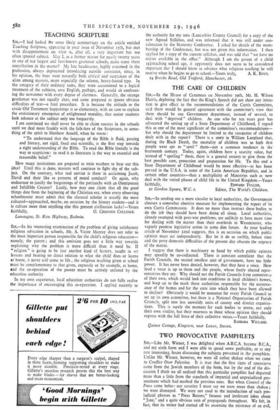TEACHING SCRIPTURE
SIR,—I had looked far some likely commentary on the article entitled Teaching Scripture, appearing in your issue of November 15th, but met with disappointment on what is, after all, a very important but too often ignored subject. May I, as a former master for nearly twenty years in one of our largest and best-known grammar schools, make some short contribution in the matter? My late headmaster, highly esteemed in the profession, always deprecated introducing outside assistance, since, in his opinion, the boys were naturally both critical and suspicious of the alien among masters, more especially the solemn, heavy-footed type. In the category of their ordinary tasks, they were accustomed to a logical treatment of the subjects, save English, perhaps, and would sit confront- ing the newcomer with every degree of alertness. Generally, the strange gentleman was not equally alert, and came prepared to ignore obvious difficulties of text—a fatal procedure. It is because the attitude to the crude Old Testament happenings is so elementary, with nc care to explain the evolutionary emergence of enlightened morality, that senior students look askance at the subject only too frequertly.
I am convinced we shall never be able to claim success in the schools until we deal more frankly with the folk-lore of the Scriptures, in some- thing of the spirit to Matthew Arnold, when he wrote: " To understand that the language of the Bible is fluid, passing and literary, not rigid, fixed and scientific, is the first step towards a right understanding of the Bible. To read the Bible literally is the way to scepticism: to read it as literature is the way to essential and reasonable belief."
How many institutions are prepared to train teachers to bear out this idea? Until this is done, masters will continue to fight shy of the sub- ject. On the contrary, what real service is there in acclaiming Jacob, David and their like as patterns of moral conduct? Or again, why endeavour to justify the bargainings of the patriarchs with an Omnipotent and Infallible Creator? Lastly, how may one claim that all the good things date from the beginning of the Christian era, when every observing schoolmaster must admit that the classical scholar is usually the most cultured—approached, maybe, on occasion by the history student—and it is culture more than anything else this present civilisation lacks!—Yours
faithfully, 0. CHANNON COLLINGE. Lanseague, St. Kew Highway, Bodmin.


































 Previous page
Previous page